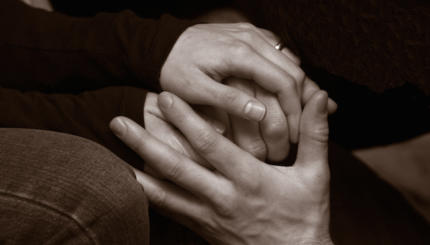An estimated one in five Americans suffer from some form of mental illness annually, and medical understanding of psychiatry and psychology has advanced dramatically in the past century.
Nonetheless, psychiatric ailments continue to be stigmatized. And while Jews have been instrumental in establishing the field of psychology — and are often stereotyped as being “neurotic” and more likely to undergo psychotherapy — the Jewish community, like society in general, is not always comfortable openly talking about mental illness or dealing with those who suffer from it. Indeed, in some quarters of the Jewish community, there remains a great reluctance to discuss the issue at all, much less to relate to it as just another medical condition. This is despite the fact that references to mental illness can be found in some of the earliest Jewish textual sources.
Do classical Jewish texts discuss mental illness?
There is little direct discussion of mental illness in the Bible, though some have suggested that various biblical figures, most notably King David, may have suffered from depression. In the Bible, “madness” is described in several places as a form of divine punishment. In Deuteronomy, shigaon — an antecedent term for the common Yiddish expression meshuggeneh, or crazy — is one of the forms of divine retribution for those who don’t heed the word of God. Later in that section, God says that the Jewish people will become “m’shuga” after a foreign people steals their crops and abuses them.
The rabbis of the mostly addressed the issue in legal terms, as a question of mental competence — their concern being principally whether someone of unsound mind is obligated by religious commandments. However, there are talmudic sources that continue the biblical equation of madness and sinfulness. In Tractate Sota, the third-century sage Reish Lakish says a person only sins when the spirit of “shtut” — madness or folly — comes over him or her. Contemporary Orthodox writers have echoed both these ideas — that mental illness is a form of sinfulness and a punishment for it.
With your help, My Jewish Learning can provide endless opportunities for learning, connection and discovery.
According to traditional Jewish law, someone who is mentally incompetent — a category known as a shoteh, derived from the Hebrew word for wanderer or vagrant — is exempt from most religious obligations and cannot get married or bear witness. The Talmud describes such a person as someone who goes out alone at night (despite the dangers) or sleeps in a cemetery — signs of his or her detachment from reality. Maimonides said the shoteh is someone who runs around naked or throws rocks. According to the Israeli psychiatrist Rael Strous, the classic definition of a shoteh is essentially a psychotic.
Echoing our contemporary understanding of the various forms of mental illness, the rabbis distinguished between those who are completely insane, those who cycle in an out of lucidity and those who are insane only in certain respects. However, their understanding of the causes of insanity would not be embraced by contemporary mental health professionals. In Tractate Ketubot, Rabbi Shimon ben Gamliel warns that idleness leads to “shimaon,” which the commentator Rashi equates with the biblical “shigaon” — craziness.
Do Jews suffer from mental illness at higher rates than the general population?
The idea that Jews are more anxious and neurotic than the norm is a widely repeated stereotype, one that has been attributed both to the many well-known Jewish neurotics who have played up their anxieties for comedic effect in film and television, as well as a tendency to celebrate Jewish anxiety as a sign of heightened intelligence. But the scientific data does not support the idea that, on average, Jews suffer from mental illness at higher rates than the general population.
A 1992 analysis of data from the National Institutes of Mental Health found that “the overall lifetime rate of psychiatric disorder did not differ among Jews as compared to non-Jews, even after controlling for demographic factors.” The study did find that Jews suffer from certain mental illnesses at higher rates, including major depression, dysthymia, schizophrenia and simple phobia, but had lower rates of others, including alcoholism. This finding echoes the results of studies conducted in the 1950s and 1960s that found elevated rates of neurosis and manic depression (now known as bipolar disorder) among the Jewish population. The 1992 analysis found that rates of bipolar disorder, panic disorder, agoraphobia, social phobia, obsessive-compulsive disorder and drug abuse did not differ significantly between different religious groups. A 2007 study found that the frequency of mood and anxiety disorders in Israel is within the range of rates found in other Western countries.
More recently, scientists discovered a genetic variation among Ashkenazi Jews that increases their risk of developing schizophrenia, but that genetic variant is also found among other religious and ethnic groups. In addition, researchers in the emerging field of epigenetics —which investigates how environmental factors can affect genetic expression — have found evidence that communities that have suffered from trauma and persecution can experience genetic changes that can then be transmitted to future generations.
In the Orthodox community, considerable attention is now being directed to the prevalence of Obsessive Compulsive Disorder, or OCD, a condition that can sometimes be hard to distinguish from a hyper vigilance (sometimes referred to as scrupulosity) regarding the performance of Jewish religious commandments. Avigdor Bonchek, an Orthodox clinical psychologist and the author of Religious Compulsions and Fears: A Guide to Treatment, has suggested that one can distinguish between OCD behavior and healthy religious devotion in two ways: True OCD sufferers, he says, carry heavy stress and emotional burdens in their focus on strictly observing the commandments, and they demonstrate an extreme inflexibility that makes it difficult for them to violate commandments even when religiously obliged to do so.
Is there a stigma against mental illness in the Jewish community?
The stigma against mental illness is not limited to Jews. Mental illness is still often perceived as less “real” than physical illness, a sign of weakness or a defect of character. Surveys have shown that American employers are reluctant to hire people with histories of psychiatric problems or who are undergoing treatment. Research suggests that a majority of people hold negative attitudes toward the mentally ill and that, for many families, mental illness is a source of shame and embarrassment. That in turn leads sufferers to conceal their condition, making it less likely that they will seek treatment.
Jews are not immune to these tendencies, as evidenced by efforts in recent years to foster a more candid discussion about mental illness in the Jewish community. However, there are also indications that Jews are more open about mental health issues than other groups. A 2012 study of older New Yorkers found that Jews had a more positive attitude toward psychotherapy than non-Jewish whites and blacks, were more tolerant of the stigma surrounding therapy and were more open to sharing their feelings. The 1992 study based on the NIMH data also found that Jews were more open to seeking professional mental health assistance than were Catholics or Protestants.
In recent years, numerous efforts have been made to address the stigma in the Orthodox community, where the fear of harming marriage prospects has drawn a curtain of secrecy around those suffering from mental illness. Marvin Winkler, an Orthodox mental health practitioner, wrote in 1977: “The fear and shame associated with mental illness in the Torah community can be compared only to that associated with the most severe Halachic transgressions.” Today, there are a number of Jewish groups focused exclusively on mental health issues in the Orthodox community, including Refuat Hanefesh, which seeks to destigmatize mental illness among the Orthodox; Chazkeinu, which offers supportive phone meetings for women struggling with mental illness; Refa’enu, which runs educational programs in Jewish schools and support groups; and Relief, which makes mental health referrals.
Are there any Jewish organizations that focus on mental health?
Yes, Besides those noted above, Elijah’s Journey is a national Jewish nonprofit that focuses on suicide prevention. In addition, virtually every local Jewish federation in North America has a Jewish Family Services agency that provides, among other things, counseling and other assistance for families and individuals suffering with mental health issues.
There seem to be so many Jewish psychiatrists and therapists out there. Is the field of psychology dominated by Jews?
Anecdotally, this sometimes seems to be the case, but there is scant hard data to support it. One study published in 2007 found that American psychiatrists were more likely than other types of physicians to be Jews (Jews made up 29 percent of psychiatrists and only 19 percent of physicians overall), but the study, of 1,000 physicians, surveyed only 100 psychiatrists.
However it is true that Jews have been instrumental in the development of psychology and psychiatry. Probably the most famous psychologist in history and the father of psychoanalysis, Sigmund Freud, was Jewish, as were many of his early associates in the field, including Erich Fromm, Alfred Adler and Bruno Bettelheim. Most of the major theorists of Gestalt psychology were Jewish. Joseph Jastrow, a Polish-born psychologist and the son of the author of a famous talmudic dictionary, was the first recipient of an American doctorate in psychology in 1898. Abraham Maslow, the psychologist famous for creating Maslow’s hierarchy of needs, was born to Russian Jewish immigrants in Brooklyn. Theorists have posed a number of ideas for why Jews are so prominent in early psychology, among them a Jewish penchant for expressing emotions verbally and a greater willingness among Jews to consult professionals about personal issues.
<!–Louis Jacobs, a British rabbi and theologian, served as rabbi of the New London Synagogue. Rabbi Jacobs lectures at University College in London and at Lancaster University. He has written numerous books, including Jewish Values, Beyond Reasonable Doubt, and Hasidic Prayer.
© Louis Jacobs, 1995. Published by Oxford University Press. All rights reserved. No part of this material may be stored, transmitted, retransmitted, lent, or reproduced in any form or medium without the permission of Oxford University Press.
–>


